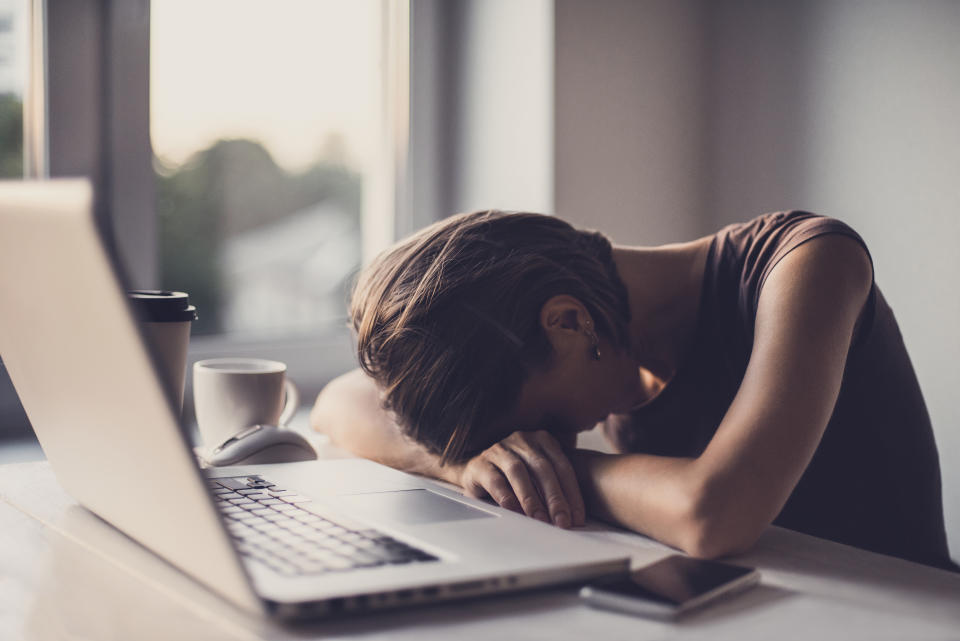Why is coronavirus isolation so exhausting?
With bars closed, parties called off and working from home mandatory for many, the coronavirus outbreak is forcing many former office workers to adjust to a slower pace of life.
For those setting up office in their kitchen, many may have expected the longer lie-in, leisurely breakfast and lack of public transport to leave them feeling well rested.
Yet the anxiety of the pandemic combined with the disruption to our normal routine is resulting in many at-home workers being more exhausted than ever.

Why is coronavirus isolation so tiring?
Prime Minister Scott Morrison has ordered people to stay at home unless they are leaving for an essential purpose just as shopping, medical care, or continuing their work they can’t perform from home.
During the unprecedented restrictions on our way of life, many Aussies are likely battling feelings of exhaustion, lethargy, and just day-to-day fatigue.
“There are numerous reasons for this, including disruption to daily routine, reduced physical activity, boredom, lack of natural light which affects the production of vitamin D – all of which disturb our circadian rhythm [body clock], leading to poor sleep quality,” Dr Meg Aroll, chartered psychologist for Healthspan, told Yahoo UK.
Australians are permitted to exercise outdoors but must maintain a 1.5m distance from anyone they do not live with. This reduced social contact may also be leaving many feeling unstimulated mentally.
“Humans are hardwired to be social beings and we thrive on social connection, cooperation, competition and love,” Liz Ritchie, psychotherapist at St Andrew’s Healthcare, told Yahoo UK.
“In the midst of lockdown, our lives have changed immeasurably and we find ourselves living a kind of surreal existence dominated by isolation, high alert, anxiety and unease about what might happen as a result of this pandemic.
“The intense anxiety about the uncertainty can cause us to feel tired, reduce our energy levels, cause physical or mental exhaustion and a lack of motivation.”

Dr Arroll is also concerned the the restrictions and isolation may trigger symptoms of poor mental health.
A lack of energy and disturbed sleeping patterns are recognised warning signs of both depression and anxiety.
With a global pandemic a first in all of our lives, many are glued to their TV for the latest update.
“The current situation means most of us are understandably in a hyper-vigilant state and any information about the virus can be a real energy buster,” Liz added.
“The related anxiety can stress the body and tax its energy resources harder than normal.
“Too many stress responses can leave the body devoid of energy, which can make us experience chronic fatigue.”

How to manage stress and exhaustion at home
The Australian Psychological Society has shared guidelines to help manage stress and mental health during this time of isolation.
Stay connected: Positive social connections are essential for our mental health and can help us cope in times of stress. In the current crisis, we are being asked to distance ourselves from others so it is important that we maintain our social networks using available methods of communication. This can be as simple as phoning a friend to share your experience, using videoconferencing technology to check in with a family member, or spending quality time with the people you live with.
Avoid difficult situations: At times, people will be required to self-isolate with others in their household. While this will provide opportunities for social connections, living with someone 24/7 with little or no time away from each other may give rise to arguments and/or tension.
Structure your day: Schedule tasks such as cooking and laundry, as well as activities you enjoy to help you stick to your routine. Structuring activities around mealtimes and bedtime can also help you keep to your schedule while ensuring you eat regularly and get enough sleep.
Tips to help you have a sense of normality and work effectively from home:
Change out of your pyjamas each morning – While you don’t have to dress as formally as you might when going into the office, getting out of your pyjamas can help you get in the right headspace to start your day.
Set up a dedicated workspace – Choose a space away from noise and with adequate lighting to set up your work desk. If possible, use an adjustable desk chair so you can work comfortably. Visit Worksafe Victoria for tips on setting up a safe workspace (bit.ly/2Wr2vjL)
Set a strict schedule – It can be hard to switch-off from work, so it is important to clearly define your working hours, ensuring you have regular breaks. Disconnect from all work-related accounts (e.g., remote desktops, email) at the end of your working day to help maintain a clear boundary between your work and home life.
Limit distractions – Being at home can mean you can be easily distracted by other people or tasks (e.g., household chores). Schedule set times where you can take a break from work to complete these tasks, rather than completing them randomly throughout the day where you can lose track of time.
Got a story tip or just want to get in touch? Email us at lifestyle.tips@verizonmedia.com.

 Yahoo Lifestyle
Yahoo Lifestyle 


